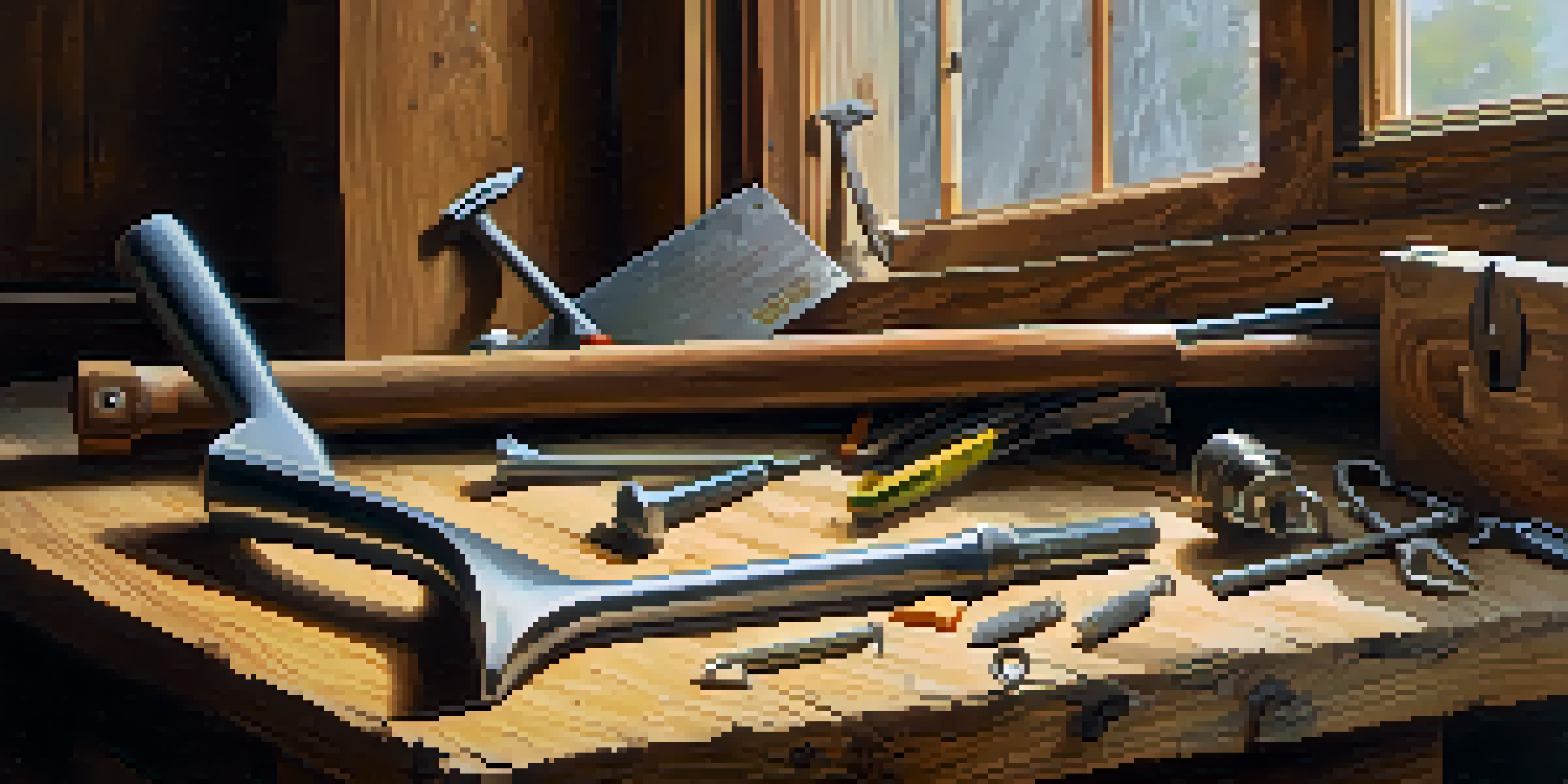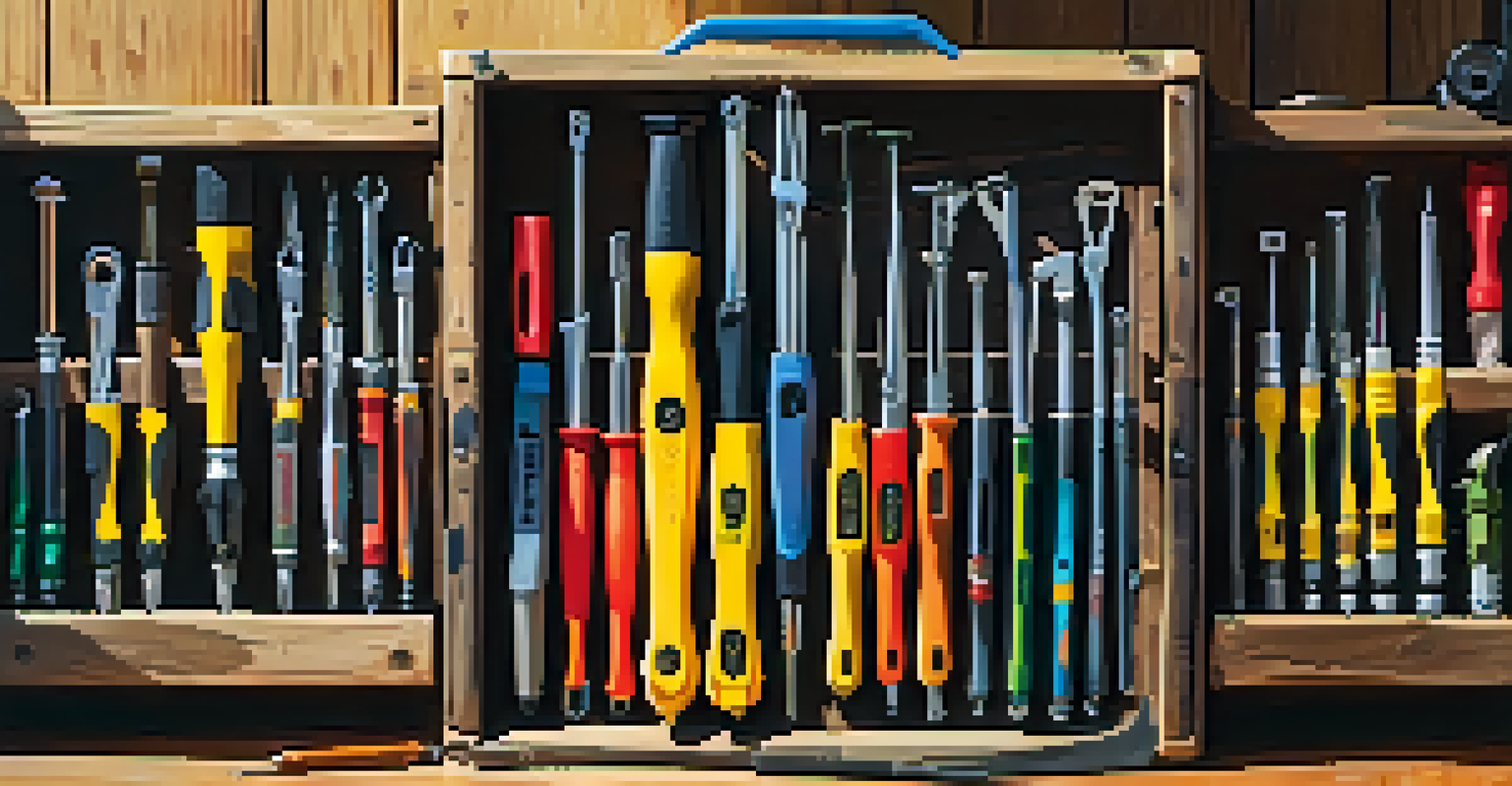The Essential Tools for Homeowners to Fix Common Issues

The Must-Have Tool: A Reliable Hammer
A hammer is an essential tool for any homeowner. Whether you’re hanging pictures or assembling furniture, this versatile tool can handle a variety of tasks. Opt for a claw hammer for its dual functionality—driving nails in and pulling them out when necessary. Investing in a quality hammer not only makes your projects easier but also enhances your overall DIY experience.
The only thing worse than having a tool that doesn’t work is not having the right tool at all.
When choosing a hammer, consider the weight and grip; a comfortable handle can make a big difference during prolonged use. For instance, lightweight hammers are great for small jobs while heavier ones are better for tougher tasks. Remember, it’s not just about having a hammer; it’s about having the right one for your needs.
Lastly, keep your hammer handy in your toolbox or a designated spot in your garage. This way, you’ll always be ready to tackle any minor repairs or projects that come your way, turning you into a more confident and capable homeowner.
Screwdrivers: The Essential Multi-Tool
Screwdrivers are indispensable for homeowners, allowing you to fix everything from loose cabinet doors to assembling new furniture. A basic set that includes both flathead and Phillips screwdrivers will cover most tasks you encounter. The key is to choose a set with comfortable grips and various sizes to tackle different screws.

Consider adding a magnetic screwdriver to your toolkit, which helps in holding screws in place, making your job significantly easier. This is particularly handy when working in tight spaces where dropping a screw could mean a frustrating search.
Essential Tools for Homeowners
Having the right tools like hammers, screwdrivers, and pliers empowers homeowners to tackle repairs and projects confidently.
Lastly, don’t underestimate the power of a good screwdriver. With the right tools, you can save time and money by handling minor repairs yourself, turning small annoyances into easy fixes.
Pliers: Your Gripping Powerhouse
Pliers are one of those tools that often get overlooked, but they can be incredibly useful for various tasks around the home. Whether you're gripping, bending, or cutting wires, having a pair of pliers on hand can save the day. Needle-nose pliers, in particular, are great for reaching into tight spots, while slip-joint pliers offer versatility for different sizes.
Safety isn’t expensive, it’s priceless.
When selecting pliers, consider investing in a couple of different types to handle various jobs. A sturdy pair of wire-cutting pliers can be a lifesaver when dealing with electrical repairs or crafting projects.
So, keep your pliers close by in your toolbox; they can be your best friend for those unexpected jobs that require a firm grip or a precise touch.
The Versatility of a Tape Measure
A tape measure is a fundamental tool that every homeowner should own. Whether you’re planning a renovation or simply hanging shelves, accurate measurements are crucial. A standard 25-foot tape measure is usually sufficient for most household tasks, providing flexibility without being cumbersome.
When using a tape measure, remember to account for factors like wall thickness or furniture size. A common tip is to measure twice and cut once—this can prevent costly mistakes and save you time.
Importance of Safety Gear
Investing in protective gear such as gloves and goggles is crucial for ensuring safety while working on home improvement tasks.
Having a tape measure readily available can empower you to take on projects with confidence, ensuring that everything fits just right in your home.
Utility Knife: The Cutting Edge of Home Repairs
A utility knife is one of the most versatile tools you can own. From opening packages to cutting drywall, this handy tool can handle various cutting tasks with ease. Look for a retractable blade utility knife, which offers safety and convenience when not in use.
It’s essential to keep a few extra blades on hand, as they can become dull after repeated use. A sharp blade will make your cutting tasks smoother and more efficient, whether you’re working on a craft project or a home repair.
In short, a utility knife is a small but mighty tool that can help streamline your home improvement projects and make everyday tasks easier.
Level Up with a Spirit Level
A spirit level is crucial for ensuring that your projects are straight and even. Whether you’re hanging artwork or installing shelves, this simple tool can prevent unnecessary adjustments later on. Opt for a standard 24-inch level, which is compact enough to store while still providing ample measurement capabilities.
When using a spirit level, remember to check it against multiple surfaces to ensure accuracy. A level that’s slightly off can lead to crooked shelves or misaligned frames, which can be an eyesore in your home.
Benefits of a Quality Tool Kit
A comprehensive tool kit keeps essential tools organized and readily accessible, enabling efficient home repairs.
Incorporating a spirit level into your toolkit will not only enhance your DIY skills but also help you achieve professional-looking results in your home projects.
The Importance of a Quality Tool Kit
Investing in a quality tool kit is an excellent way to prepare for various home repair needs. A well-rounded kit typically includes essential tools like a hammer, screwdrivers, pliers, and a tape measure, among others. Having everything in one place means you can tackle repairs without having to search high and low for each tool.
Look for kits that come with a sturdy toolbox or bag to keep everything organized. This not only protects your tools but also makes it easy to grab and go when you need to work on a project.

Ultimately, a comprehensive tool kit empowers you to take on home repairs with confidence, ensuring you’re never caught unprepared when an issue arises.
Safety First: Essential Protective Gear
While tools are vital for repairs, don’t forget about safety gear. Items like gloves, goggles, and a dust mask can protect you from injuries and hazards while working on projects around the house. Investing in quality protective gear is just as important as investing in tools.
For instance, safety goggles can shield your eyes from flying debris when using power tools, while durable gloves can prevent cuts and abrasions during handling. A dust mask is particularly useful when sanding or working with materials that create fine particles.
By prioritizing safety, you ensure that your home improvement projects are not only successful but also completed without injury, making your experience much more enjoyable.